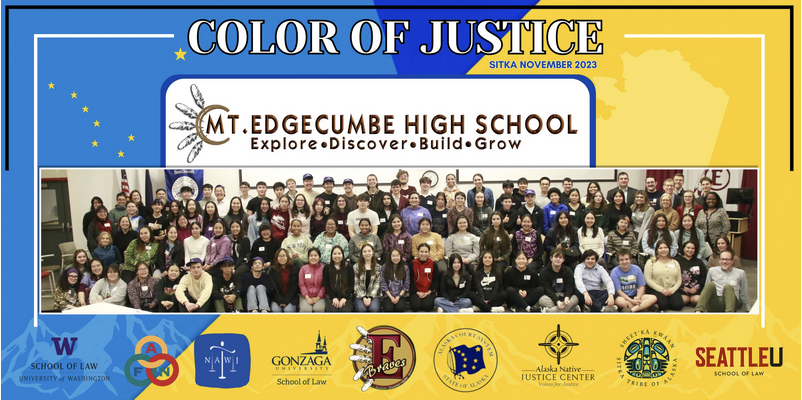
Last November, 86 Mount Edgecumbe High School (MEHS) students became lawyers, judges, and jurors for a single afternoon as they decided the fate of fictional defendants. The mock trial—which provided the students a glimpse at what it’s like to work in the field of law—was part of the Color of Justice youth conference, held in-person in Sitka for the first time since 2019.
Started by the National Association of Women Judges in 2001, Color of Justice is a two-day event designed for high school juniors and seniors to learn and experience what a career in the legal field could look like for them. The program particularly encourages participation among women and people of color, populations traditionally underrepresented in the legal field.
This year’s cohort of students enjoyed a packed agenda, including activities like the mock trial, “Constitutional Cranium,” a Tribal justice quest, and “You Be the Judge,” where players debated and decided the outcomes of real cases. Through a speed-mentoring session and presentations from Alaska Native lawyers and law schools, the students spent time with legal professionals like Bobbie Allen, a Fairbanks Superior Court law clerk, and Peter Boskofsky, Koniag general counsel, both MEHS graduates who talked about their journeys from Sitka to law school and beyond.

Supreme Court Justice Jude Pate, who hails originally from Sitka, returned to the community to bring incredible energy and support to the event. He reminded participating MEHS students that “this is their court” and shared that his dream is for an MEHS graduate to replace him when he retires from his position.
One goal of the program is to increase the number of Alaska Native lawyers and judges. Color of Justice alumni, including Magistrate Judge Pam Smith, participated as adult mentors at the event. Smith, an Alaska Native magistrate judge for the Nome District Court, shared how attending Color of Justice as a teen inspired her to become a lawyer. Kawerak Staff Attorney Sigvanna Tapqaq also supported students throughout the event and mentored student judges during the mock trial.
Additional thanks for supporting and hosting Color of Justice goes to: University of Washington School of Law; the Alaska Federation of Natives; Gonzaga University School of Law; the National Association of Women Judges; the Alaska Court System; the Alaska Native Justice Center; RurAL CAP; the Sitka Tribe of Alaska; Seattle University School of Law; and MEHS.
The next Color of Justice event will take place in Anchorage, in April of this year.
